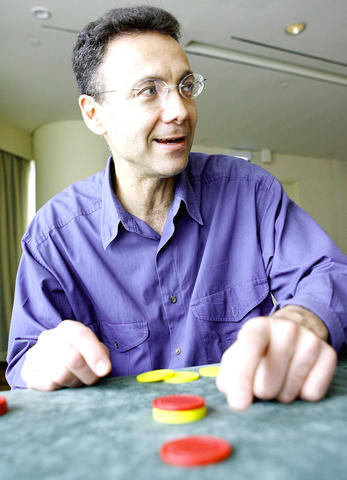Casinos in Asia, take heed: There is no such thing as a foolproof high-tech system for catching professional cheats.
That's the warning from former swindler Richard Marcus, who says he ripped off US$20 million from the world's gaming tables over more than two decades.
Marcus, 50, is now a consultant to the casinos he used to cheat.

PHOTO: AFP
He was never caught despite the array of surveillance gear installed by gaming operators in Las Vegas, Monte Carlo, Macau and Australia, he said in a recent interview.
"I was the most wanted casino cheater ever in the history of the world. They just could never catch me," Marcus said, his face beaming with pride at his 25-year track record.
He said he remained at large partly because casinos are too reliant on technology to catch the conmen.
Asia's gaming industry is undergoing an unprecedented expansion and will face the same problem, said Marcus, an American now living in Paris.
"There is never a foolproof system because it depends on people. Never 100 percent," he said on the sidelines of a regional gaming conference in Singapore.
"No matter how many millions of dollars they invest in surveillance systems, if you don't have the people, if the people are not smart, they are going to get beat anyway and that's the problem," he said.
Even Asian casinos run by Las Vegas Sands and other heavyweights of the industry are ill-equipped to handle professional cheats because their local staff lack experience, Marcus said.
Sands spearheaded the expansion of gaming in Macau, when Sands Macau opened in 2004.
Las Vegas Sands is also developing one of Singapore's two multi-billion-dollar gaming complexes. Malaysia's Genting International has broken ground on the city-state's other gaming and entertainment development.
Early last month, Macau said it had overtaken the Las Vegas Strip as the world's biggest casino draw, saying it raked in more than US$7 billion last year, five years after the sector was liberalized there.
"All the cheating teams -- especially the ones that are good -- they are going to converge in Macau more and more because you have big, brand new casinos with inexperienced people," Marcus said.
"So they are going to get killed," he said.
Marcus also foresees a similar "big problem" in Singapore when the Sands and Genting-run complexes open by 2010.
He said that casino operators can limit the financial damage from professional cheats by following his advice and placing more emphasis on training staff to detect deft moves at the gaming tables.
He also trains casino surveillance teams. But security is not just their responsibility -- no one from the dealers to the one monitoring the video cameras can afford to relax, he said.
Marcus said he quit cheating in 2000 because he had made enough money and that it is "almost like a natural crossover" to go from casino swindler to consultant.
"I do it mainly because I need to be doing something to keep my mind going," he said.
He has written five books about gambling cheats, including American Roulette, a memoir of his own experiences as a jet-setting casino swindler.

On Tuesday, US President Donald Trump weighed in on a pressing national issue: The rebranding of a restaurant chain. Last week, Cracker Barrel, a Tennessee company whose nationwide locations lean heavily on a cozy, old-timey aesthetic — “rocking chairs on the porch, a warm fire in the hearth, peg games on the table” — announced it was updating its logo. Uncle Herschel, the man who once appeared next to the letters with a barrel, was gone. It sparked ire on the right, with Donald Trump Jr leading a charge against the rebranding: “WTF is wrong with Cracker Barrel?!” Later, Trump Sr weighed

HEADWINDS: Upfront investment is unavoidable in the merger, but cost savings would materialize over time, TS Financial Holding Co president Welch Lin said TS Financial Holding Co (台新新光金控) said it would take about two years before the benefits of its merger with Shin Kong Financial Holding Co (新光金控) become evident, as the group prioritizes the consolidation of its major subsidiaries. “The group’s priority is to complete the consolidation of different subsidiaries,” Welch Lin (林維俊), president of the nation’s fourth-largest financial conglomerate by assets, told reporters during its first earnings briefing since the merger took effect on July 24. The asset management units are scheduled to merge in November, followed by life insurance in January next year and securities operations in April, Lin said. Banking integration,

LOOPHOLES: The move is to end a break that was aiding foreign producers without any similar benefit for US manufacturers, the US Department of Commerce said US President Donald Trump’s administration would make it harder for Samsung Electronics Co and SK Hynix Inc to ship critical equipment to their chipmaking operations in China, dealing a potential blow to the companies’ production in the world’s largest semiconductor market. The US Department of Commerce in a notice published on Friday said that it was revoking waivers for Samsung and SK Hynix to use US technologies in their Chinese operations. The companies had been operating in China under regulations that allow them to import chipmaking equipment without applying for a new license each time. The move would revise what is known

Artificial intelligence (AI) chip designer Cambricon Technologies Corp (寒武紀科技) plunged almost 9 percent after warning investors about a doubling in its share price over just a month, a record gain that helped fuel a US$1 trillion Chinese market rally. Cambricon triggered the selloff with a Thursday filing in which it dispelled talk about nonexistent products in the pipeline, reminded investors it labors under US sanctions, and stressed the difficulties of ascending the technology ladder. The Shanghai-listed company’s stock dived by the most since April in early yesterday trading, while the market stood largely unchanged. The litany of warnings underscores growing scrutiny of